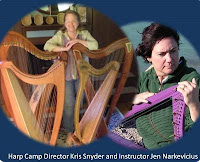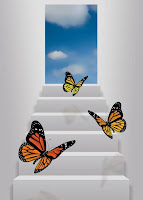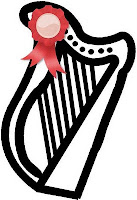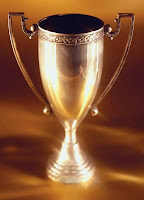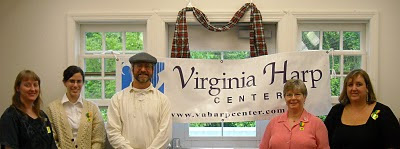No tidbits this week – I’m at the Ohio Scottish Games judging the Harp Competition and then participating in the Ohio Scottish Arts School in Oberlin Ohio. I’m learning a ton of new stuff and sharing a little as well. I look forward to “seeing” you next week!
Blog
-
In the good ol’ summer time
Its Summertime! As I mentioned last week, its also time for summer camps – especially harp camps!
I hope you’re going to join me in PA in August. But if not, I hope you’re going to get to one of the other learning opportunities available for adult learners at all levels of harp performance. Or that you’ll be able to get to one of the conferences such as Somerset Folk Harp Festival or HarpCon. And I hope I’ll get to meet you at some of these events!
But one of the downsides to all this is also an upside. Its summer, our schedules seem to be more free and there are plenty of opportunities to play. And this is where the downside comes in – if you have a sudden ramp up in the amount of time you’re playing you are exposing yourself to the potential for injury. Not good – it totally cramps your practicing and playing!
It is also when we’re learning so many things that we start tweaking our own play and that too can sometimes lead to injury. If you get a great tip – how you sit at the harp, the type of seat you use, the shoes you wear (and not just if you play pedal!), the geometry of your hands, arms or shoulders – all of these great ideas and tips will be NEW TO YOU! Therefore you must incorporate these changes slowly into your practice. Don’t modify your sitting position and then practice for 2 hours in this new position – you’ll greatly increase your probability of injury.
And it doesn’t have to be so noticeable – simply changing the type of music you play (going from all traditional tunes to reading classical off a page for instance) can also open you to potential injury.
Athletic trainers suggest you implement changes like these about 10% weekly.Being a musician, regardless of your level of performance requires physical conditioning – you’re asking a lot of your body. So, just like runners or boxers, you must, as a musician, remember to warm up, cool down, stretch and stay strong and fit for the long haul.
-
Harp Camp
I am very pleased to have been invited to teach at Lever Harp Camp again this year. So, if you’re in the mid-Atlantic region (or you like to travel!) join us for our 15th year. Harp Camp will be August 19, 20, and 21 in South Central Pennsylvania – easily accessible to harpers from anywhere and at any level. I am excited to be teaching with Director Kris Snyder as well as presenters Marianna Nystrom and Lucy Stevens.
The award winning instructors of Harp Camp strive to provide a highly personalized, fun-filled, supportive environment where lever harp players at all levels extend their technical skills and enhance their appreciation for this historic instrument. We also work on building a healthy sense of self-esteem – encouraging our attendees to try new things and give them an understanding of the skills necessary to reach individual performance goals. In addition, MHTP Graduates have the potential to gain 6 CEUs for participation.
The format is tailored to you:
No frustration of either information that you aren’t ready for, or waiting for people with less experience to understand what is being presented.
We are offering three tracks: Beginner, Intermediate, and Advanced…each workshop you take will be geared toward your proficiency and comfort level.These three days will be filled with creativity and fun. Workshops this year will include:
* Putting on Airs (learning by ear): demonstrating the processes of learning-by-ear and working with an Air
* Practice Makes Me with Sticky Wickets: getting the best from the time you have and confronting common issues
* Improvisation from Composition: demonstrating a variety of improvisational techniques and methods for converting compositions into improvisationsIn addition, MHTP graduates may attend optional presentations covering analyzing music for appropriateness for CMP work/how to change the selection for use; organizing binders for best flow; how to move from piece to piece and how to move from key to key.
We’ll spend time on mechanical issues that come with the harp: changing strings, adjusting levers. Games, Creative and Directed Ensemble and age appropriate activities are included!
If you have always wanted to try the harp without the commitment, we will have rentals available and a separate novice track designed to give you the optimum experience of trying the harp – with no strings attached!
Harp Camp has a capped attendance policy – this allows our class sizes to remain small- giving our attendees the personal attention for our instructors that they deserve.
For more information go to http://www.jeniuscreations.com/Harp_Camp.php (or write me a comment/question).
-
The excitement is growing palpable as we move closer to September and the Harp in the Highlands and Islands Tour. September is rapidly approaching but not fast enough for me! I was disappointed that the spring tour was incomplete due to technical issues but we leave on the autumn trip on 6th September with a full complement. We’ll be spending an entire week – eight days and seven nights – on a customized tour of the Scottish Highlands and Islands seeing some of the places you’ve played about and learning tunes along the way!
As described in previous posts, this tour will go through some of the most beautiful scenery to be seen anywhere and includes the Isle of Skye, the western Highlands, the Spey valley and Cairngorm Mountains. Each day we will learn a tune or add to our harp lore. Our travelers will be great fun with broad diversity – some brand new to the harp and others further along on their musical journeys. I’m certain they will all enjoy this trip. And their travel logistics are greatly improved and simplified with a lovely small harp awaiting them in Scotland. We can all travel with light hearts, without fear of the airlines careless handling of our sweet investments.
This intimate tour will consist of four travelers. This very small group size allows flexibility so each day David can show us the very best Scotland has to offer as well as those special things that can’t be planned. Along the way I’ll share tunes that match our travels, experiences, and mood (to learn more about David and me, see the earlier posts and check out the website).
We leave in just three months. We will post while we are there – I can’t wait to share our trip with you!I’m sorry if you’re not one of the lucky few who are joining us this year. If you become enchanted (or just plain envious) while you read our posts, never fear. We are planning on making the trip again next year – so you could join us then and see breathtaking Scotland over the arm of your own small harp! Just let me know – drop me a comment here or send me an email. I am so looking forward to sharing this incredible opportunity with you! For details and more information go to http://www.jeniuscreations.com/Harp_Tours_of_Scotland.php.
Until then, keep practicing, consider which are your favorite tunes and join us next year to learn more! And I’ll keep posting tidbits here – just to contribute to your harp development.
-
Ohio Scottish Arts School – OSAS at Oberlin
Are you planning to attend the 32nd Annual Ohio Scottish Arts School in Oberlin OH from 26th June – 2nd July, 2010????
I sure hope so! This is a fantastic opportunity. You might get to see more of the world famous Ohio Tartan:
But also, regardless of your level of experience – from beginner to master, OSAS has something to offer you! Much of this information is directly from the OSAS website: http://www.ohioscottishartsschool.com/home_files/osas_harp.htm. Here is a little bit about what you can expect:
All Students are expected to bring their own instrument – it would be hard to study for a week without a harp!
The Scottish Harp classes will focus on:
• Basic harp technique for beginners and intermediates
• Repertoire at all levels, including tunes for competition sets
• Scottish style, including ornaments, lilt, and dance typesIn addition, there are excellent students. In addition to being great harpers of various levels of proficiency, they are very friendly and convivial. You can look forward to not only the excitement of “pick up” evening jam sessions in which you have the chance to develop accompaniment patterns and learn more tunes but also the verve of spending that much time with other people who are as crazy about playing the harp as you are and who love the repertoire as much as you do!
You’ll study Scottish dance music, airs, and songs, focusing on ornamentation, Scottish style, accompaniment, and learning by ear. In addition there are lectures, practice time, and playing in sessions. Classes really do cover everyone from beginners who have played for a few months, intermediates, and advanced players.
If you’ve been to OSAS before and you haven’t signed up I hope you do so soon before the course fills up. And if you’ve never been before – what are you waiting for?
But hurry, registration closes 4th June – that’s not too far away.Hope to see you there. If you have questions that can’t be answered by the website, post me a comment and I’ll do my best to answer you or put you in touch with someone who can!
See you there!
-
Goal setting
Well, it’s about the middle of the year – that time when most of us are looking at our calendars and wondering how it could possibly be nearly June! But, clearly it is – the honeysuckle is blooming, the birds have more to say than the news media Talking Heads, and its getting a mite warm.
So, back at the winter holidays did you write down your goals for this coming year? They didn’t have to be big goals – could have been to learn one new tune every month, or to teach at least one favorite tune to someone else so you could play it together, or to master rolling chords down smoothly, or to practice at least a little each day, or to actually count when playing, or — as you can see, the list of goals is nearly endless.
I’m sure you headed my suggestion and did write down each of your goals. At this near midpoint in the year, it is the perfect time to review those goals and assess your progress on them. Are you making progress? Did you forget about some of them? Is one of them really giving you a hard time? If you’ve captured your goals and if you review them periodically you have the basis for a self tune-up or the makings of a good lesson with your tutor or the potential to take a private lesson when one of the “names” comes into town to give a workshop.
In addition, as you review your goals and your progress, make needed modifications. Goals are not chiseled in stone – this is a good opportunity to identify which of your goals was too easy, which are going to take more time than you initially thought, which goals were burning bright in the winter but now are not so attractive (yes, you can break up with some of your goals – just be sure you don’t break up with every goal!). Note the modifications you make to your goals and in an interval (maybe at the next solstice?) review and adjust again.
And remember that this grand goal setting is essential to see progress, but just as important is the small goal setting you need to do each and every time you sit down to practice. Be sure that those small daily goals will align to help you meet your big goals so that you are able to see progress.
And don’t forget to set and meet the goals to enjoy playing the harp and to share your gift with others. -
Come out and compete at the Ohio Scottish Games!
It is coming summer and we’re well and truly in the thick of the Scottish Games season. I hope that you are polishing your tunes, learning your history and getting ready to enter a Scottish Harp Society of America sanctioned harp competition near you!
I love to compete – I love the drive to master new music, pushing myself to learn tunes that will meet the judge’s expectations and my own, and putting together a performance of which I can be proud.
In addition, I love competitions because they are friendly. I enjoy cheering for my friends (long held and newly met). And at nearly every competition I’ve entered I have had the opportunity to ask a fellow competitor to teach me a wonderful tune that I fell in love with on first hearing. In addition, I really enjoy that the camaraderie is more important to most competitors than the win – they just genuinely enjoy being there and hearing one another play. Of course, its nice to win too.
Competition, while not for everyone, surely helps us push ourselves just a bit harder, to excel and to grow. We learn not only the music but also the “what” behind the tunes we select. It’s just this thirst to learn about the history and culture behind the tunes that lead to our Harp in the Highlands and Islands tours!
I am very pleased and honored to have been invited to judge the Ohio Scottish Games at the Lorain County Fairgrounds on 26th June. Ohio is a fun games and I have a special place for it in my heart because it is the first competition I ever entered. I made a fellow competitor (and now lifelong friend) in the parking lot! And I look forward to participating because I have so many friends there and such fond memories!
I hope you’ll come out and compete. In addition to being a fun and enjoyable games, Ohio has a lot of wonderful prizes. The rest of the Games is good. I’ll be teaching a workshop. And right after, you could attend the Ohio Scottish Arts School! (more on that later).
Come join me – here’s the link: http://www.ohioscottishgames.com/2010Harp_Entry_form.html
-
Drink it in!
I’ve talked about how everything impacts your harping. How we need to be open to all the things that help us become better harp players, more suited to the physical, mental, and emotional aspects of being harpers. So, here’s another in the physical column. And I know you’ve heard it before: drink your water!

But why do you need to stay hydrated to improve your harp playing? Well, the Mayo clinic tells us that the body is about 60% water, and we lose water through a number of bodily functions and not just the obvious one – you also lose water through breathing and sweating. So, it is essential to help replenish the water you’ve lost through going about your day.
But also, dehydration affects your brain. While severe dehydration may result in confusion or lethargy, milder dehydration can leave you with headaches, moodiness, tiredness and confusion. None of these will help you learn, practice or perform well at your harp or frankly, anywhere.
So, be certain, especially before you practice or perform, the stay hydrated – drink you water, it’s the easiest way to get water into your system!
-
Southern Maryland Harp Competition Results – redux
Well, it would have been very clever of me to include the photos in my last post! They are here, in this post, to assure that you call see the outcome and our excellent competitiors. I hope it will encourage you to come participate next year! Photos courtesy of Jo Morrison.
Pictured from left are Judge Jo Morrison, Caroline Kemper,Mike Connors, Marilyn Newman, and Donna Bennett. -
Southern Maryland Harp Competition Results
It was a “fine soft day” in Southern Maryland, characteristic of changeable spring. And while authentic, the weather was not perfect for a bustling Celtic Festival. But the Southern Maryland Celtic Society Festival went on. And stalwart harp players came out to share their music with an enthusiastic audience.
Judge Jo Morrison adjudicated the competition, sanctioned by Scottish Harp Society for the first time. She also provided an excellent concert with Port Righ before the competition and a workshop as well. They used the opportunity not only to delight the audience with great tunes but also to educate them on the music, the instruments, and the Celtic nations themselves. Jo also delivered a wonderful workshop – increasing everyone’s Strathspey repertoire by one!
The competition was well attended and the competitors all played very well. Results:
Beginner 1st Place: Marilyn Newman
Novice 1st Place: Donna Bennett
2nd Place: Mary Abbott
Journeyman 1st Place: Caroline Kemper
2nd Place: Mike Connors
Harper of the Day: Mary Abbott
In addition we were very pleased to have this competition selected as a venue to award a Scholarship to Somerset Folk Harp Festival. This scholarship supports an Apprentice Harper to participate in the Festival this summer. The winner of this coveted scholarship was Donna Bennett – although she entered her first competition at the Novice Category, she performed solidly at the Apprentice level.
Also special thank you to our Prizes Sponsor – Virginia Harp Center. All our competitors received incredible prizes in addition to medals and the traditional Southern Maryland etched glass mugs.


